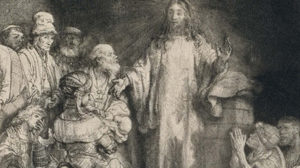Reflection:
An article in the local newspaper a few years ago detailed the case of a young, healthy father of three who succumbed to a particularly nasty case of H1N1 flu. He was put into a medically induced coma, and three times the doctors told his wife to gather the family because they didn’t think he would survive the night. In the end, he not only survived but returned to full, active living. Many people in and out of the medical community called it a miracle. The young man reported that his faith and that of his family and friends is so much stronger now as they praise and thank God for the blessing of his renewed life.
In the Gospels, belief is often likewise prompted by a miraculous occurrence that affects not only the person involved but their entire social network. Someone is raised from the dead or healed of a long illness, and the entire town enthusiastically converts. Indeed, it would seem foolish not to, given the hope that similar miracles might result for oneself.
It is easy to have faith as long as it “works” for you – as long as the people you love are healed, the people you hang around with share your belief, and things go well in your life. Yet that type of faith is superficial, centered on self, and too frequently short-lived. If the young man had died, would his family still come out of it with strengthened faith and conviction of God’s blessings? What about when others become disillusioned, and begin attacking with arguments and doubts that are hard to answer? Can faith be sustained when the Gospels’ difficult sayings and profound challenges grate against the status quo and demand personal sacrifice?
Countless people left Jesus when the going got rough, when they realized their discipleship would ensure the cross instead of health, wealth, and ease. At times, in fact, the popular thing to do was to renounce this man and his tough teachings. They wanted a Messiah who would bless them according to their own definition of blessings, and follow their will instead of God’s.
The reality of faith is a paradox. Jesus does not promise an easy life – in fact, quite the opposite. Instead, he promises faithfulness, strength to endure whatever happens, and resurrection in this life and the next. Jesus is not a prosperity evangelist; he is a realist. He does not negate or erase the experience and suffering of this life; he brings meaning to it.
Jesus has accompanied me through so many tombs. Despite all odds, in the reality of death, even when all seemed hopeless, God continues to bring new life. So I will continue the journey, consciously working to deepen my dependence on and belief in the God who is my rock and stronghold, the source of my existence, the One who calls my name and whom I serve. I hope that no matter what may happen or what others may do, I can join with the disciples and say, “Lord, to whom would I go? You have the words of everlasting life.”
Amy Florian is a teacher and consultant working in Chicago. For many years she has partnered with the Passionists. Visit Amy’s website: http://www.corgenius.com/.








